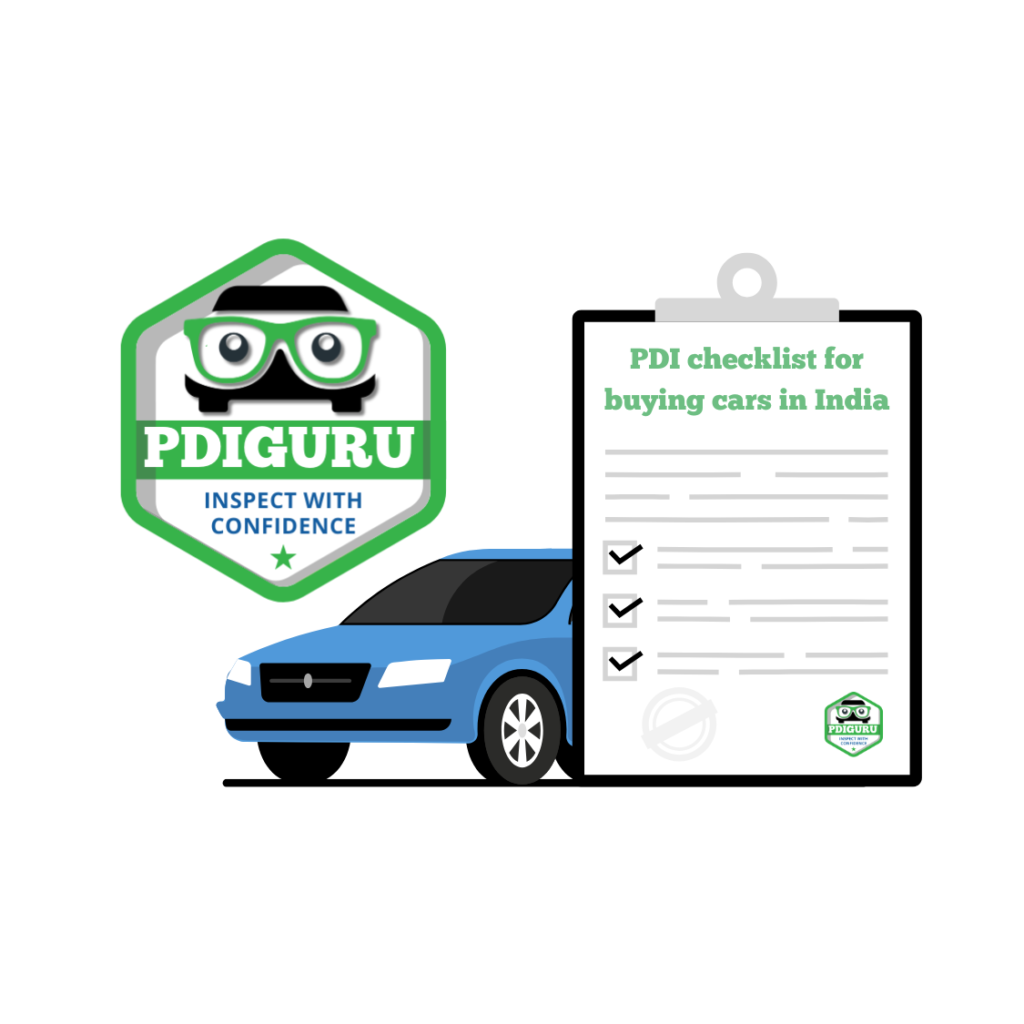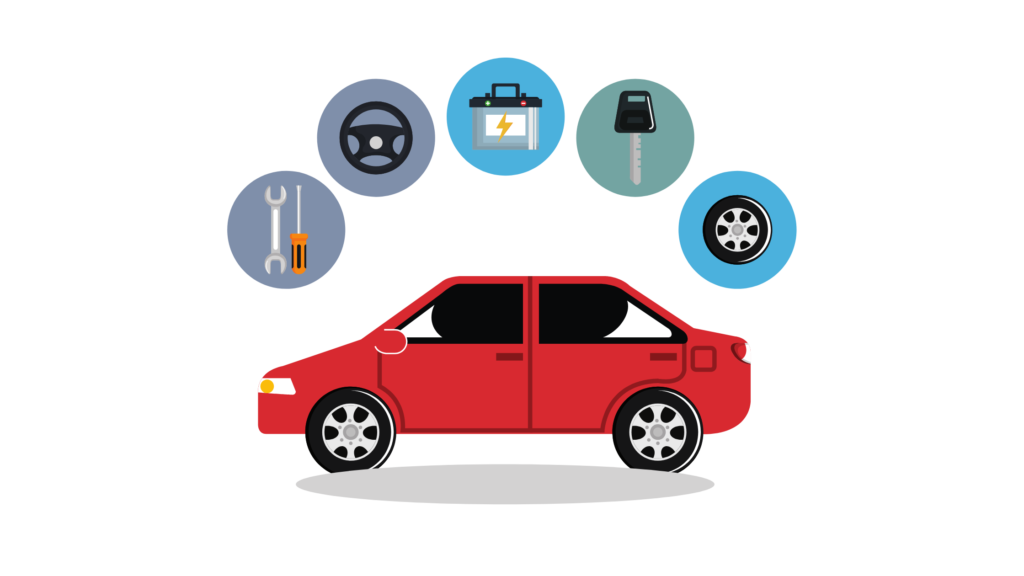Introduction
In India, buying a new car is a big deal. It’s not just a purchase—it’s an investment. Yet, in the excitement of picking out your dream vehicle, many buyers overlook one critical step: the Pre-Delivery Inspection (PDI). Imagine receiving your new car, only to discover defects or issues that were hidden during transport or assembly. This can easily be avoided with a thorough PDI. A comprehensive PDI checklist can help you ensure you’re getting exactly what you’ve paid for. And we’ve made it easy for you—download our checklist from below!

What is Pre-Delivery Inspection (PDI) in India?
A Pre-Delivery Inspection (PDI) is the process where a new car undergoes a thorough inspection to ensure it’s free of defects and in top condition before delivery to the customer. In India, the PDI process is crucial due to the diverse manufacturing and transport challenges cars face, from long-distance shipping to varying quality control standards.
Why is Pre-Delivery Inspection (PDI) Crucial for Car Buyers in India?

India’s car market is growing rapidly, with both local and international manufacturers competing for attention. While this gives buyers more options, it also means quality control can vary. Here’s why you cannot afford to skip the PDI in India:
- Quality Control Variations
Car manufacturers in India range from high-end luxury brands to budget-friendly options, meaning the quality of assembly and materials can vary. A PDI helps ensure your car meets the highest standards. - Transportation Damages
India’s vast road network, while improving, is still challenging for transporting cars. Cosmetic damages like scratches, dents, or even mechanical issues can happen during transit. A PDI ensures these are caught before delivery. - Assembly Line Differences
With different plants across regions, inconsistencies can sometimes arise. A detailed PDI ensures that all specifications are met, and your vehicle is up to standard.
The Pre-Delivery Inspection Process in India

The PDI process can vary slightly between dealerships, but it generally covers these key areas:
1. Exterior Inspection: Look for Cosmetic Damage
The exterior of your car should be inspected carefully. This is your first line of defense against transport-related damages.
- Paint Quality: Look for irregularities, chips, or discoloration.
- Body Panels: Check for misaligned panels, gaps, or scratches.
- Glass: Ensure the windshield, side windows, and mirrors are free from cracks or chips.
- Wheels & Tires: Check for tire quality and ensure the alloy wheels are free from any visible damage.
PDIGuru Pro Tip
“Pay special attention to the alignment of body panels and paint finish. Even minor imperfections can sometimes be overlooked, but they’re easy to spot when you look closely!”
2. Interior Inspection: Comfort and Functionality
Next, make sure everything inside the car is working as expected. A PDI ensures the car’s interior is free from defects and that all systems function correctly.
- Seats & Upholstery: Inspect the seat covers, stitching, and adjustments.
- Dashboard & Controls: Test all dials, buttons, and touchscreens to ensure they’re fully operational. Also, check the infotainment system and air conditioning.
- Cleanliness & Smells: The interior should be clean and free from any unpleasant odors.
3. Mechanical Check: Engine & Transmission
It’s crucial to ensure that all mechanical aspects are sound and ready for smooth performance.
- Engine Performance: Ensure the engine starts easily and runs smoothly. Listen for any unusual sounds, and make sure no warning lights appear.
- Transmission & Gears: Test the gear shifting to ensure smooth transitions between gears.
- Brakes & Suspension: Check the brakes, suspension, and steering for any irregular sounds or issues.
- Fluid Levels: Verify that the fluid levels—engine oil, brake fluid, and coolant—are all at the correct levels.
PDIGuru Pro Tip
“When testing the engine, listen carefully for any abnormal noises like knocking or rattling—these could indicate potential issues that a quick visual inspection might miss.”
4. Technology & Safety Systems Check
Modern cars come packed with tech features and safety systems, so make sure everything works as expected:
- Infotainment & Connectivity: Check the Bluetooth connection, navigation system, and touchscreen.
- Safety Features: Ensure airbags, ABS, traction control, and reverse sensors are operational.
- Driver Assistance Systems (ADAS): If the car is equipped with features like lane assist, blind-spot monitoring, or parking sensors, verify that they function correctly.
Step-by-Step PDI Process at Indian Dealerships
While the process can vary slightly, here’s how most dealerships conduct a PDI in India:

- Initial Inspection: Once you finalize the car, the dealership will walk you through the first inspection to confirm the car matches your specifications.
- Mechanical Inspection: A technician checks the engine, brakes, transmission, and all mechanical parts to ensure everything is in working order.
- Technology Test: All tech features like infotainment systems, climate control, and driver assistance features are tested.
- Exterior & Interior Check: The technician inspects the car’s body, paint, upholstery, and cleanliness.
- Final Review: Once everything is confirmed, the car is prepped for delivery. If any issues arise, the dealership will address them.
Common Challenges in the PDI Process in India
Even with a structured PDI process, Indian car buyers often face certain challenges:
- Limited Transparency
Dealerships may not always provide visibility into the full PDI process. Always ask for a detailed PDI report and checklist. - Rush During Peak Seasons
During high-demand periods, dealerships may rush through the PDI to meet delivery timelines, potentially overlooking important checks. Don’t let the pressure rush you! - Lack of Documentation
Make sure to get written documentation for any issues found during the PDI. This will help you during future warranty claims.
How to Protect Yourself During PDI in India

Here are a few actionable tips to ensure a smooth PDI and avoid surprises later:
- Perform Your Own Inspection: Bring a trusted mechanic or use a PDI checklist to inspect the car yourself.
- Take Photos & Notes: Document the condition of the car at delivery, especially if any issues are found. This serves as evidence.
- Don’t Rush the Process: Don’t let the dealership rush through the inspection—take your time to ensure everything checks out.
- Request On-the-Spot Fixes: If defects are found, ensure that the dealership fixes them before delivery.
- Understand Your Warranty: Verify what is covered under your warranty, ensuring that all necessary documents are in place before you drive off.
Common Issues Found During PDI and How to Handle Them with Dealership
During a PDI, several common issues can surface, especially with used vehicles. Some of the most frequent concerns include:
- Suspension Wear: This could lead to discomfort or handling issues down the road.
- Brake Pad Thickness: Thin brake pads could cause safety concerns and need replacement soon.
- Engine Leaks: Minor leaks that may require attention to prevent more serious damage.
- Electrical Faults: Issues like faulty lights or wiring problems.
If you notice any of these issues, it’s important to address them with the dealership. You can request repairs before finalizing the purchase or, in some cases, negotiate the cost of repairs. For more information on common issues and how to handle them, check out our dedicated blog on Common Issues Found During Pre-Delivery Inspection (PDI) and How to Handle PDI Issues and Dealership Complaints Effectively.
Frequently Asked Questions (FAQs)
To ensure a comprehensive PDI, it’s essential to check every detail of your car, from the exterior to the electrical systems. Our Pre-Delivery Inspection (PDI) Checklist for Cars in India covers all key areas, including common issues like scratches, misaligned parts, and tire defects. Download our detailed checklist for step-by-step guidance on performing a thorough inspection. It includes expert tips and space for notes to help you catch potential issues before delivery.
Some common issues include faulty electronics, unbalanced suspension, or minor leaks. These problems can often be fixed before taking the car home, saving you time and money. Here you can find more about the Common Issues Found During Pre-Delivery Inspection (PDI) and How to Address Them.
Yes, a Pre-Delivery Inspection (PDI) is especially crucial for used cars to uncover hidden issues like engine problems or suspension wear. For a detailed guide on inspecting pre-owned vehicles, check out our Essential PDI Checklist for Buying Used Cars in India.
If you discover any issues during the PDI, discuss them with the dealership. Make sure they are resolved before accepting the car, or ask for a solution. If you need more guidance on handling these types of situations, we’ve written a dedicated blog on “How to Handle PDI Issues and Dealership Complaints Effectively: A Guide for Car Buyers” This resource will help you navigate the next steps when dealing with discrepancies and ensure you have a smooth resolution process.
Conclusion: Why PDI is Essential for Car Buyers in India
In the fast-paced world of car buying in India, the Pre-Delivery Inspection in India is a step that should not be overlooked. It safeguards your investment, ensures that your car is in perfect condition, and helps you avoid surprises. By following a thorough PDI checklist and ensuring transparency, you can enjoy peace of mind knowing your new car is ready to hit the road.
To make your PDI process easier, we’ve created a detailed PDI checklist that covers all key inspection areas. Download it now!



